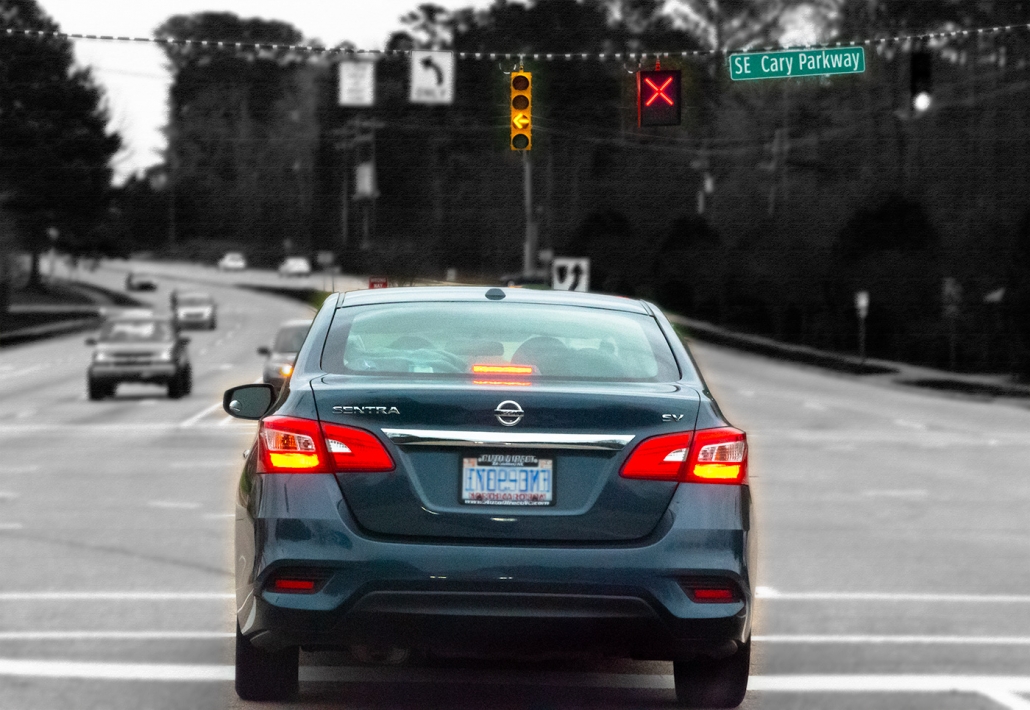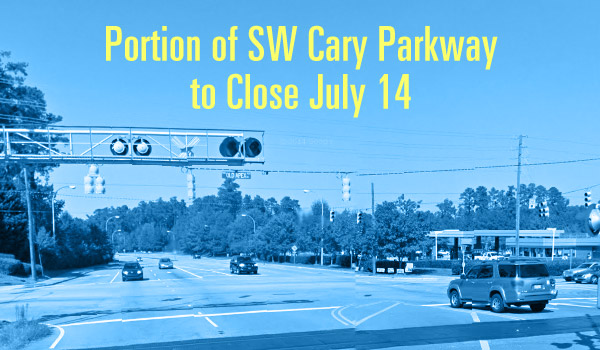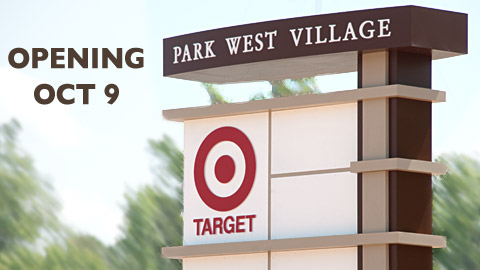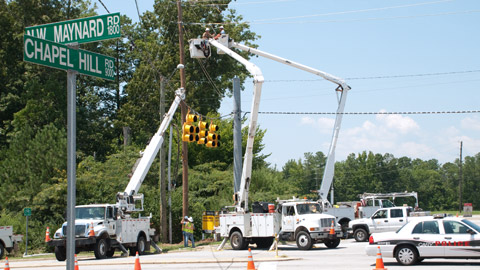Nation’s First Dynamic Left Turn Intersection Operating in Cary
Cary, NC — There’s a new traffic pattern in town; one that’s never been seen before in the US. The NC Department of Transportation brought the uniquely designed Dynamic Left Turn Intersection to Cary late last week as a means of improving traffic flow, particularly in off-peak times.
How the Intersection Works
The new intersection will only affect drivers turning left onto Cary Parkway from eastbound Tryon Road. Instead of the previous setup where drivers only turned left once the protected green arrow appeared, there will now be two LED-overhead signals that will activate or deactivate the rightmost turn lane depending on traffic conditions.
Executive Director of the Regional Transportation Alliance, Joe Milazzo II, says RTA approached NCDOT with the concept a little over two years ago.
“The various elements you will encounter at a dynamic left-turn intersection are not new,” said Milazzo. “We have all seen two left-turn lanes, a flashing yellow arrow, overhead red “X” indications like they have on Edwards Mill Road by PNC Arena, etc. However, while the individual elements at a Dynamic Left Turn Intersection are all familiar to motorists, what is new is this particular combination that will allow for more efficient operation for off-peak travel.”
At Peak Times
During peak travel periods, such as rush hour, both left-turn lanes will be active. Left-turning vehicles will turn only under a protected green arrow, as they do now. During these times, a pair of overhead signals will display a white left-turn arrow over a black background to indicate the rightmost left-turn lane is active.
At Non-Peak Times
During most of the day there is not enough traffic going left to require the use of both left-turn lanes.
In these slower times, the rightmost left-turn lane will become deactivated and the overhead signal for that lane will display a red “X” over a black background. The leftmost left-turn lane will remain active, and drivers will receive a flashing yellow arrow, allowing them to turn left when it is safe to do so. A protected green arrow will still be displayed occasionally to reduce any backups in that lane.
Milazzo says, “The purpose of the red X lane closure during off-peak periods is to enable the display of a flashing yellow arrow for the remaining, single left-turn lane.”
This flashing yellow light, combined with the other elements of the intersection, should significantly decrease travel delays.
The NCDOT video below illustrates what you can expect to see.
How Often Will the Traffic Pattern Change?
A frequent question the RTA has received from the community is how often will the intersection change from one left turn lane with a flashing yellow arrow, to having both left-turn lanes open with only green arrows displayed?
Milazzo says The Town of Cary and NCDOT will determine the operating hours for each combination of left-turn lanes and signal display.
“My understanding is that the initial plan for the Cary location is for both left-turn lanes to remain open, without a flashing yellow arrow, during the AM and PM peak periods. The rest of the time – about 85% of the week – the single left-turn lane and flashing yellow arrow combination will operate. Of course, those hours could change over time,” said Milazzo.
What Made Cary the Ideal Location?
The intersection of Tryon Road and Cary Parkway is the first pilot location of the Dynamic Left Turn but the same intersection model will soon be in Clayton, too. The intersection shift will be for drivers turning left on U.S. 70 Business at Town Center Boulevard into the Walmart shopping center.
NCDOT professional staff reviewed a number of locations across multiple counties before making their location choices. According to Milazzo, Cary and Clayton had the right combination of traffic volumes and geometry to serve as the initial pilot locations to test and evaluate the concept.
“The RTA applauds NCDOT and the Town of Cary for their partnership with the regional business community and for their willingness to explore innovative techniques like this. We are excited to learn more together,” said Milazzo.
The First Week of Operation
ABC11 reported the intersection’s debut was not exactly perfect. With travelers citing confusion and dangerous conditions, the NCDOT made the following statement.
“The town of Cary and NCDOT will jointly monitor the intersection to determine how to fine-tune the dynamic left turn system, and we’ll make any necessary adjustments. We were expecting there to be a learning curve with the public to use it. We will continue to help educate the public on using the dynamic left turn. Drivers need to pay attention going through this intersection, and they should know that using a de-activated lane is a traffic violation.”
Cary Town Manager Sean Stegall says that on one hand, he’s thrilled that Cary is a place where progressive ideas can be born and nurtured, yet, on the other hand, he knows that it is a difficult adjustment, even for him.
“It’s new and it’s understandably frustrating. A big part of it is, though, that we know how important traffic management is to citizens overall, so if we don’t continue to support efforts that the state’s doing to try to find new and creative ways to handle traffic better, we’ll never be able to stay on top of the problem,” said Stegall.
Thinking back 15 years, Stegall can remember when America started to build traffic circles, a foreign concept that had been proved successful for decades in Europe.
“The great thing about traffic circles from an environmental standpoint is there are less carbon emissions because you don’t have to be stopping unnecessarily. Going through that behavioral change was a big one, but now the traffic circles are understood by people and they work,” said Stegall.
“It took a while to get there, but it’s been a worthwhile benefit. They are less expensive, they’re way better for the environment and they reduce traffic, so we’re hoping this will have those same results.”
For more information, see the NCDOT announcement and the Dynamic Left Turn intersection webpage.
Story by Ashley Kairis. Video by NCDOT and featured image by Hal Goodtree.










